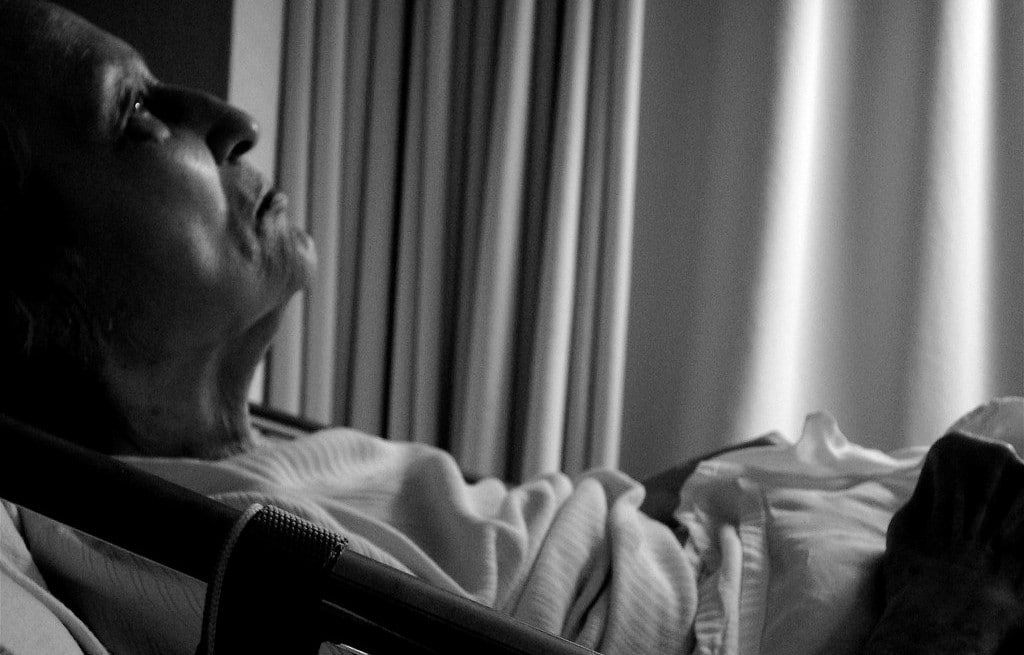
Iboga root bark is the oldest known form of the visionary iboga experience; ibogaine and total alkaloid extracts are processed from iboga. | Image Source: Wikimedia Commons Kgjerstad
Ibogaine has been hailed as a miracle drug, an unparalleled addiction interrupter, and a oneiorphrenic — or “waking dream creator” — by some experts. Others are more reserved, holding that the great enthusiasm online and in some scientific circles is exaggerated. Whether or not it will prove a wonder drug, it’s undoubtedly one that is attracting interest in the public eye. But what exactly is ibogaine? What’s the difference between iboga and ibogaine, and which one is right for you? Whether you are interested in addiction treatment, psychospiritual healing, or just want to know more about this new frontier of an evolving science, this primer will provide these basic answers.
Iboga
Iboga can refer to many plants, including Tabernanthe iboga, Tabernanthe manii, and Voacanga africana, which have been used traditionally for centuries by African cultures such as the Bwiti. A huge, visionary dose of root bark is consumed as a rite of passage, and smaller quantities are taken for healing ceremonies and hunting.
Though there is a strong argument for the full, traditional experience, many treatment centers have found that too much iboga root bark needs to be taken for a full experience. Consuming such a huge quantity of plant bark can be quite difficult. In the traditional Bwiti initiation ceremony, doses as high as 1 kilogram of root bark have been consumed throughout the ceremony. This is the maximum dose observed, and different providers have different philosophies about exact doses—a typical therapeutic dose ranges from 5 to 100 grams, depending on the person and the treatment goal, but eating a large quantity of fibrous plant matter like that can make anyone nauseous. Moreover, iboga root bark seems more likely to cause the physical discomfort, nausea, and vomiting so associated with the iboga ritual, as compared with its other forms. Some, however, contend that this purging is an important spiritual component of the experience.
Another drawback of iboga is that the amount of active chemicals can vary widely between species or even between individual plants. This makes it hard to administer an amount that’s in the therapeutic window and not too strong or too weak. Many patients who use iboga may still experience some withdrawal afterward, possibly for this reason. Still, there is a long history of its use, and those seeking a truly spiritual experience may appreciate what is seen as a direct communication with the Bwiti “tree of life.”
Ibogaine
Ibogaine, or ibogaine hydrochloride, is the name of the principle and best-researched active compound in iboga. It can appear as off-white crystals or in the form of a clear solution. Doses of about 15-20 mg/kg (so as high as 1400 mg for a 150 lb individual) are typical for addiction treatment. Many treatment centers have had excellent results with it, especially with opiate addiction as it can completely eliminate withdrawal. It has been extracted and synthesized with 95-99% purity, so the dose can be very carefully controlled and calibrated to suit your specific needs.
Ibogaine passes through your system more quickly, in about 14-24 hours, leaving less of an “afterglow” than iboga. This also means that it has a shorter recovery period, which is more in line with what some individuals need. Pure ibogaine tends to lead to more hyperactivity afterward, whereas iboga results in a more balanced state.
Ibogaine is only one of eleven or more compounds found in the various iboga species. Some, like tabernanthine, have good research showing that they have similar active properties to ibogaine, but others are still being studied. For some, this is a good argument for pure ibogaine — you know exactly what you’re getting. Our bodies also metabolize ibogaine into noribogaine, a metabolite produced in the liver, which may be responsible for some therapeutic effects. On the other hand, the true therapeutic value of iboga could come from another chemical, or even interactions between multiple chemicals, which is the case for ayahuasca. The traditional benefits of iboga may be lost along with the hundreds or thousands of additional compounds you may be missing out on.
Total Alkaloid Extract (TA)
Total Alkaloid extract (TA), is a reconciliation of the pros and cons of iboga and ibogaine. All of the active chemicals (or alkaloids) are extracted from iboga root bark and concentrated, appearing as brown, clumped crystals which are often dissolved in a dark solution. Therapeutic doses range from 2-5 grams. About half of this is ibogaine, but many others are psychoactive too, some have very little research, and there are likely others that are totally unknown. This means that you get all of these chemicals that may supplement ibogaine, but less of the nausea, physical discomfort, or ambiguity of how much of a dose you’re getting with iboga root.
Many TA users say that it is a significant improvement to the comfort and clarity of their experience. Many treatment providers, such as the Iboga Wellness Center of Costa Rica, prefer it due to both its ease of use and deeper psycho-spiritual experience. It generally lasts longer than pure ibogaine at 24-36 hours, and it has a slower onset.
More research is still needed into the many other active ingredients, but anyone who is seeking the full experience of an iboga journey with less of the physical difficulty may benefit from TA.
Which Is Right for Me?
As we collect more anecdotes and research about iboga and ibogaine treatment, we will find which is best suited to a given individual and given addictions. As we learn about the different chemicals of iboga, we could even create personalized cocktails of iboga alkaloids.
If you are experiencing opiate addiction and withdrawal, pure ibogaine may be best for you due to its reputation for completely eliminating addiction withdrawal. If you are seeking a full psycho-spiritual experience, you may want to seek out a treatment center using TA. If you value tradition, trust in the wisdom of generations of healers, and are ready to undergo discomfort for your journey, iboga itself may be the best choice for you.










Am in Kenya Nairobi .How can I get IBOGA HCl or Ta